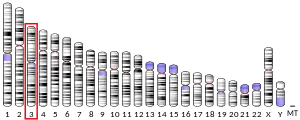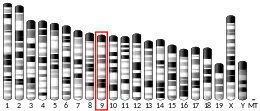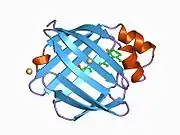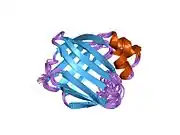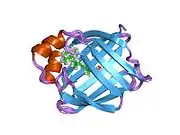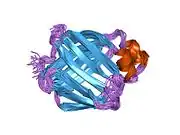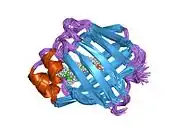RBP1
Retinol binding protein 1, cellular, also known as RBP1, is a protein that in humans is encoded by the RBP1 gene.[5][6][7]
| RBP1 | |||||||||||||||||||||||||||||||||||||||||||||||||||
|---|---|---|---|---|---|---|---|---|---|---|---|---|---|---|---|---|---|---|---|---|---|---|---|---|---|---|---|---|---|---|---|---|---|---|---|---|---|---|---|---|---|---|---|---|---|---|---|---|---|---|---|
 | |||||||||||||||||||||||||||||||||||||||||||||||||||
| |||||||||||||||||||||||||||||||||||||||||||||||||||
| Identifiers | |||||||||||||||||||||||||||||||||||||||||||||||||||
| Aliases | RBP1, CRABP-I, CRBP, CCRBPI, RBPC, retinol binding protein 1 | ||||||||||||||||||||||||||||||||||||||||||||||||||
| External IDs | OMIM: 180260 MGI: 97876 HomoloGene: 2175 GeneCards: RBP1 | ||||||||||||||||||||||||||||||||||||||||||||||||||
| |||||||||||||||||||||||||||||||||||||||||||||||||||
| |||||||||||||||||||||||||||||||||||||||||||||||||||
| |||||||||||||||||||||||||||||||||||||||||||||||||||
| |||||||||||||||||||||||||||||||||||||||||||||||||||
| |||||||||||||||||||||||||||||||||||||||||||||||||||
| Wikidata | |||||||||||||||||||||||||||||||||||||||||||||||||||
| |||||||||||||||||||||||||||||||||||||||||||||||||||
Function
RBP1 is the carrier protein involved in the transport of retinol (vitamin A alcohol) from the liver storage site to peripheral tissue. Vitamin A is a fat-soluble vitamin necessary for growth, reproduction, differentiation of epithelial tissues, and vision. The gene harbors four exons encoding 24, 59, 33, and 16 amino acid residues, respectively. The second intervening sequence alone occupies 19 kb of the 21 kb of the gene.[5]
Clinical significance
Cellular retinol-binding protein-1 (CRBP-1) contributes to the maintenance of the differentiative state of endometrial cells through the regulation of bioavailability of retinol. On the converse, loss of CRBP-1 is associated with development of endometrial cancer.[8]
References
- GRCh38: Ensembl release 89: ENSG00000114115 - Ensembl, May 2017
- GRCm38: Ensembl release 89: ENSMUSG00000046402 - Ensembl, May 2017
- "Human PubMed Reference:". National Center for Biotechnology Information, U.S. National Library of Medicine.
- "Mouse PubMed Reference:". National Center for Biotechnology Information, U.S. National Library of Medicine.
- "Entrez Gene: RBP1 retinol binding protein 1, cellular".
- Aström A, Tavakkol A, Pettersson U, Cromie M, Elder JT, Voorhees JJ (September 1991). "Molecular cloning of two human cellular retinoic acid-binding proteins (CRABP). Retinoic acid-induced expression of CRABP-II but not CRABP-I in adult human skin in vivo and in skin fibroblasts in vitro". J. Biol. Chem. 266 (26): 17662–6. doi:10.1016/S0021-9258(19)47422-X. PMID 1654334.
- De Baere E, Speleman F, Van Roy N, De Paepe A, Messiaen L (1998). "Assignment of the cellular retinol-binding protein 1 gene (RBP1) and of the coatomer beta subunit gene (COPB2) to human chromosome band 3q23 by in situ hybridization". Cytogenet. Cell Genet. 82 (3–4): 226–7. doi:10.1159/000015107. PMID 9858824. S2CID 46851294.
- Orlandi A, Ferlosio A, Ciucci A, Francesconi A, Lifschitz-Mercer B, Gabbiani G, Spagnoli LG, Czernobilsky B (June 2006). "Cellular retinol binding protein-1 expression in endometrial hyperplasia and carcinoma: diagnostic and possible therapeutic implications". Mod. Pathol. 19 (6): 797–803. doi:10.1038/modpathol.3800586. PMID 16575402.
Further reading
- Herr FM, Ong DE (1992). "Differential interaction of lecithin-retinol acyltransferase with cellular retinol binding proteins". Biochemistry. 31 (29): 6748–55. doi:10.1021/bi00144a014. PMID 1322170.
- Siegenthaler G, Tomatis I, Chatellard-Gruaz D, et al. (1992). "Expression of CRABP-I and -II in human epidermal cells. Alteration of relative protein amounts is linked to the state of differentiation". Biochem. J. 287. ( Pt 2) (2): 383–9. doi:10.1042/bj2870383. PMC 1133176. PMID 1332671.
- Aström A, Tavakkol A, Pettersson U, et al. (1991). "Molecular cloning of two human cellular retinoic acid-binding proteins (CRABP). Retinoic acid-induced expression of CRABP-II but not CRABP-I in adult human skin in vivo and in skin fibroblasts in vitro". J. Biol. Chem. 266 (26): 17662–6. doi:10.1016/S0021-9258(19)47422-X. PMID 1654334.
- Wei LN, Mertz JR, Goodman DS, Nguyen-Huu MC (1990). "Cellular retinoic acid- and cellular retinol-binding proteins: complementary deoxyribonucleic acid cloning, chromosomal assignment, and tissue specific expression". Mol. Endocrinol. 1 (8): 526–34. doi:10.1210/mend-1-8-526. PMID 2856408.
- Colantuoni V, Cortese R, Nilsson M, et al. (1985). "Cloning and sequencing of a full length cDNA corresponding to human cellular retinol-binding protein". Biochem. Biophys. Res. Commun. 130 (1): 431–9. doi:10.1016/0006-291X(85)90435-8. PMID 2992469.
- Nilsson MH, Spurr NK, Lundvall J, et al. (1988). "Human cellular retinol-binding protein gene organization and chromosomal location". Eur. J. Biochem. 173 (1): 35–44. doi:10.1111/j.1432-1033.1988.tb13963.x. PMID 3356192.
- Sherman DR, Lloyd RS, Chytil F (1987). "Rat cellular retinol-binding protein: cDNA sequence and rapid retinol-dependent accumulation of mRNA". Proc. Natl. Acad. Sci. U.S.A. 84 (10): 3209–13. Bibcode:1987PNAS...84.3209S. doi:10.1073/pnas.84.10.3209. PMC 304838. PMID 3472205.
- Kooistra T, Lansink M, Arts J, et al. (1995). "Involvement of retinoic acid receptor alpha in the stimulation of tissue-type plasminogen-activator gene expression in human endothelial cells". Eur. J. Biochem. 232 (2): 425–32. doi:10.1111/j.1432-1033.1995.425zz.x. PMID 7556191.
- Jaconi S, Rose K, Hughes GJ, et al. (1995). "Characterization of two post-translationally processed forms of human serum retinol-binding protein: altered ratios in chronic renal failure". J. Lipid Res. 36 (6): 1247–53. doi:10.1016/S0022-2275(20)41132-0. PMID 7666002.
- Liu W, Hellman P, Li Q, et al. (1997). "Biosynthesis and function of all-trans- and 9-cis-retinoic acid in parathyroid cells". Biochem. Biophys. Res. Commun. 229 (3): 922–9. doi:10.1006/bbrc.1996.1903. PMID 9005841.
- Sundaram M, Sivaprasadarao A, DeSousa MM, Findlay JB (1998). "The transfer of retinol from serum retinol-binding protein to cellular retinol-binding protein is mediated by a membrane receptor". J. Biol. Chem. 273 (6): 3336–42. doi:10.1074/jbc.273.6.3336. PMID 9452451.
- De Baere E, Speleman F, Van Roy N, et al. (1999). "Assignment of the cellular retinol-binding protein 1 gene (RBP1) and of the coatomer beta subunit gene (COPB2) to human chromosome band 3q23 by in situ hybridization". Cytogenet. Cell Genet. 82 (3–4): 226–7. doi:10.1159/000015107. PMID 9858824. S2CID 46851294.
- Christensen EI, Moskaug JO, Vorum H, et al. (1999). "Evidence for an essential role of megalin in transepithelial transport of retinol". J. Am. Soc. Nephrol. 10 (4): 685–95. doi:10.1681/ASN.V104685. PMID 10203351.
- Skowyra D, Zeremski M, Neznanov N, et al. (2001). "Differential association of products of alternative transcripts of the candidate tumor suppressor ING1 with the mSin3/HDAC1 transcriptional corepressor complex". J. Biol. Chem. 276 (12): 8734–9. doi:10.1074/jbc.M007664200. PMID 11118440.
- Folli C, Calderone V, Ottonello S, et al. (2001). "Identification, retinoid binding, and x-ray analysis of a human retinol-binding protein". Proc. Natl. Acad. Sci. U.S.A. 98 (7): 3710–5. Bibcode:2001PNAS...98.3710F. doi:10.1073/pnas.061455898. PMC 31117. PMID 11274389.
- Orlandi A, Francesconi A, Clément S, et al. (2002). "High levels of cellular retinol binding protein-1 expression in leiomyosarcoma: possible implications for diagnostic evaluation". Virchows Arch. 441 (1): 31–40. doi:10.1007/s00428-001-0576-7. PMID 12111198. S2CID 195243470.
- Strausberg RL, Feingold EA, Grouse LH, et al. (2003). "Generation and initial analysis of more than 15,000 full-length human and mouse cDNA sequences". Proc. Natl. Acad. Sci. U.S.A. 99 (26): 16899–903. Bibcode:2002PNAS...9916899M. doi:10.1073/pnas.242603899. PMC 139241. PMID 12477932.
- Cvetković D, Williams SJ, Hamilton TC (2003). "Loss of cellular retinol-binding protein 1 gene expression in microdissected human ovarian cancer". Clin. Cancer Res. 9 (3): 1013–20. PMID 12631600.
- Hosaka B, Park SI, Felipe CR, et al. (2004). "Predictive value of urinary retinol binding protein for graft dysfunction after kidney transplantation". Transplant. Proc. 35 (4): 1341–3. doi:10.1016/S0041-1345(03)00380-4. PMID 12826154.
- Schmitt-Gräff A, Ertelt V, Allgaier HP, et al. (2003). "Cellular retinol-binding protein-1 in hepatocellular carcinoma correlates with beta-catenin, Ki-67 index, and patient survival". Hepatology. 38 (2): 470–80. doi:10.1053/jhep.2003.50321. PMID 12883492. S2CID 23904734.
